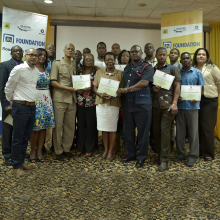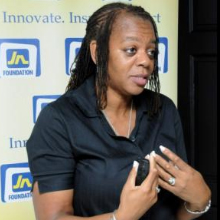Senior Educator Urges Teachers to ‘Step Up Their Game’
Joan Spencer-Ernandez, lecturer in Special Education at the School of Education, The University of the West Indies, has called for teachers to ‘step up their game’ and be better prepared for the mixed ability classroom where students have diverse needs.
She was speaking recently at a Professional Development Day exercise for teachers from the Buff Bay and Port Maria Primary Schools, participants in the JN Foundation’s iLead educational leadership programme. The three-year initiative is being conducted in partnership with the Ministry of Education and is targeted to improve student outcomes at five schools in eastern parishes during year one of the programme.
The workshop provided teachers with practical tips and strategies to improve literacy.
Mrs. Spencer-Ernandez, who is also a consultant to the iLead programme, expressed concern that many teachers were still employing a ‘one size fits all’ approach in the classroom and do not plan for students who may be ahead or behind the class average.
“The curriculum provided is intended as a guide,” she explained, “and lessons must be adjusted to meet varying ability levels.”
She also urged teachers to be creative in their approach to improving literacy levels, and not rely only on prescribed texts for their lessons. Using material already available in the classroom, she demonstrated to the more than 50 participants how different levels of comprehension questions could be set from posters showing mathematical shapes and from food labels.
“I do not subscribe to the usual defence that resources are insufficient. Grade one or grade five reading material can be used in the grade four classroom if that is what the student’s reading level requires,” she advised.
In a follow-up interview, Mrs. Spencer-Ernandez spoke about the need for teacher training institutions to better equip teachers to meet the needs of a diverse population of students, and advocated for the support of the Ministry of Education in establishing new courses in Literacy and Numeracy strategies in that regard.
She also pointed to the need for parents to work in tandem with the school by supporting teachers’ assessments of the literacy needs of their children; and the provision of different textbooks, if the teacher has determined that those would better support their children’s needs.
“The school environment is really about everyone achieving his or her full potential,” she concluded.
Dr Renee Rattray, director of education projects at JN Foundation who oversees the iLead programme, also underscored the need for teachers to plan for the diversities that exist in their classrooms.
“A doctor does not write the same prescription for all of his patients; and, in my experience as an educator, students who are appropriately assessed, stimulated and nurtured produce exciting results,” she said.
The director of education projects further revealed, “We have already seen improvements in behaviour stemming from the change management programmes we have started, and we are confident that these will translate into many areas of progress in these schools.”












